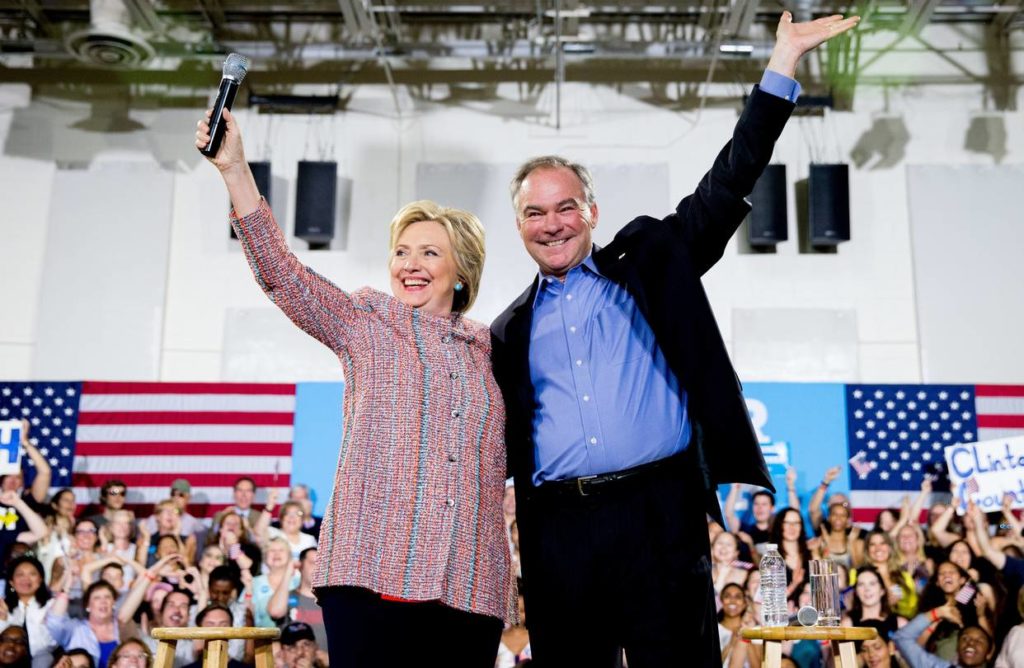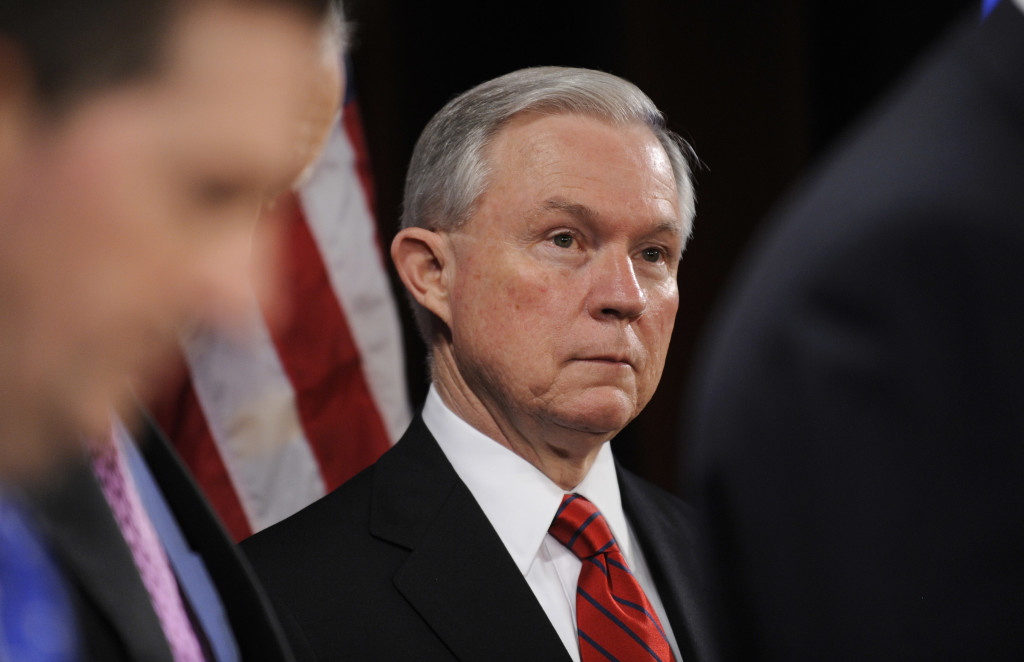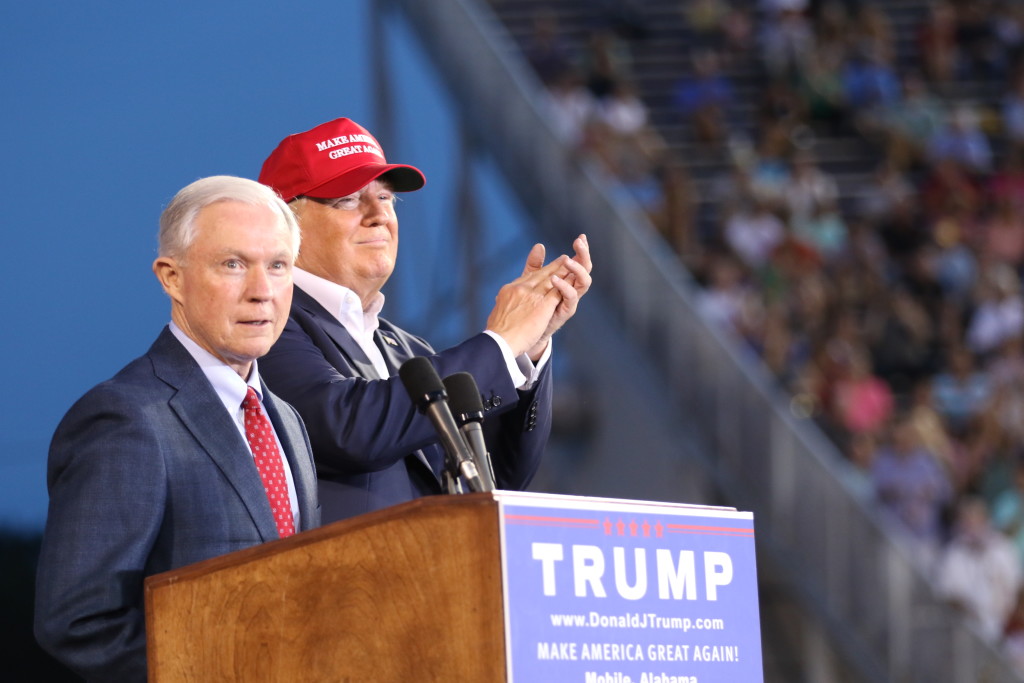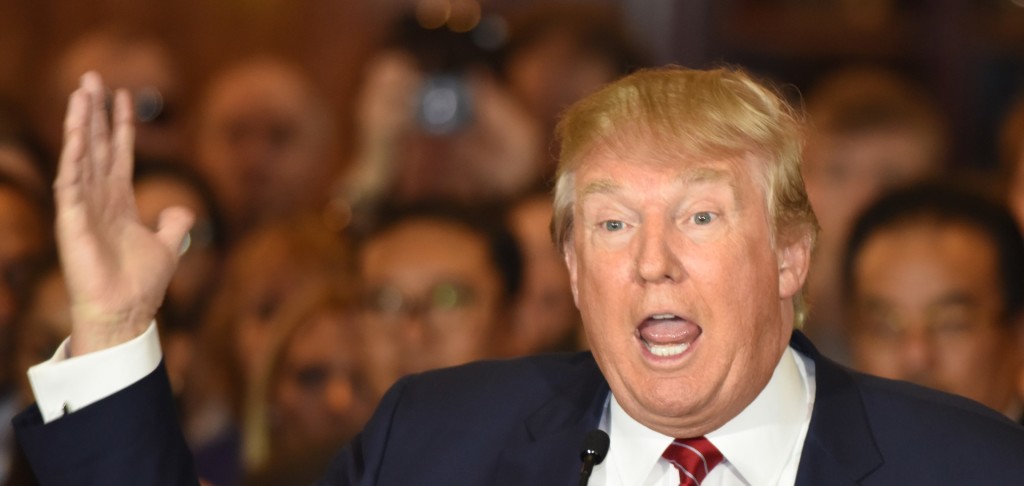Hillary Clinton VP search focus is Tim Kaine, Tom Vilsack, Tom Perez

Hillary Clinton‘s vice presidential search is centering on three main contenders, with an announcement expected as soon as Friday as the Democrat prepares for her party’s national convention next week in Philadelphia. Clinton’s campaign has focused in recent days on Virginia Sen. Tim Kaine, a former governor, mayor and one-time Catholic missionary fluent in Spanish; Agriculture Secretary Tom Vilsack, an ex-Iowa governor and longtime Clinton ally; and Labor Secretary Tom Perez, a progressive champion who would be the first Hispanic on a major-party ticket, according to the Associated Press, which cites Democrats familiar with the search. The Democrats cautioned that Clinton had not yet reached a final decision and was weighing a number of factors, including the person’s readiness to be president, personal compatibility and ability to help her administration govern. Massachusetts Sen. Elizabeth Warren, a favorite of liberals, remains in the mix and offers the campaign a fundraising juggernaut and the tantalizing prospect of an all-female ticket. But Warren is not expected to be the final choice, the AP reported, citing Democrats familiar with the process. They spoke to AP on condition of anonymity to describe private discussions about the search process. Clinton’s choice will be the culmination of a closely held search for a running mate, run by a small group of longtime advisers and confidantes. Preparing for a showdown with Republican presidential nominee Donald Trump, Clinton has sought to project an inclusive campaign aimed at “breaking down barriers and building bridges” to mobilize the diverse coalition of voters who twice elected President Barack Obama. Clinton is expected to announce her decision during a two-day campaign swing in Florida later this week. The vice presidential rollout could come at either a Friday rally at the Florida State Fairgrounds in Tampa or at a Saturday rally at Florida International University in Miami, where two-thirds of the student body is Hispanic. Following next week’s Democratic National Convention in Philadelphia, the newly minted ticket is expected to embark on a campaign bus tour, reminiscent of the “First 1,000 Miles” convoy that took Bill Clinton, Al Gore and their spouses across eight states after the party’s 1992 convention. Trump’s choice of Indiana Gov. Mike Pence, a conservative former congressman, for the GOP ticket was not viewed as requiring her to choose a specific running mate in response, according to the AP, citing Democrats familiar with the process. Campaign officials declined to comment. Kaine has been considered a leading contender for weeks based on his broad experience in Virginia, a presidential battleground state, as governor, senator and mayor of Richmond. He also served as chairman of the Democratic National Committee and as a lawyer working on fair housing and civil rights issues. Vilsack, the longest-serving member of Obama’s Cabinet, has known Clinton for many years — his late brother-in-law worked with her in the early 1970s — and she was among his most prominent surrogates in his come-from-behind gubernatorial victory in 1998. Perez, meanwhile, is highly regarded by the White House for his policy chops and could potentially galvanize Latinos who have been turned off by Trump’s harsh rhetoric about Hispanics. The son of immigrants from the Dominican Republic, Perez played a behind-the-scenes role as a federal prosecutor, a top aide to the late Sen. Ted Kennedy and the head of the Justice Department’s civil rights division. Both Vilsack and Kaine have been through the process before. Vilsack was among the final group considered by John Kerry in 2004 and Kaine was vetted by Obama’s team four years later. If either Vilsack or Perez were selected, they would be required to resign from Obama’s Cabinet. Clinton’s decision will be steeped in her personal experience. She was involved in her husband’s selection of Gore in 1992 and has the unique vantage point of having seen up close the various roles played by the vice president. In an interview this week with Charlie Rose of CBS News, Clinton said her main criterion was “would this person be a good president? You know, I am afflicted with the responsibility gene and I know what it’s like being president.” Quizzed on potential running mates, Clinton noted that Kaine had “never lost an election” and was a “world-class mayor, governor and senator.” She said Warren had “put the agenda of inequality front and center.” Clinton also praised retired Adm. James Stavridis, a former NATO supreme allied commander, calling him “exceptional.” Other possible choices include Housing Secretary Julian Castro, Colorado Gov. John Hickenlooper, Ohio Sen. Sherrod Brown and New Jersey Sen. Cory Booker. Clinton met with Castro, Hickenlooper and Warren at her Washington home on Friday. Republished with permission of the Associated Press.
Jeff Sessions could be a good choice for Donald Trump’s VP

Who presumptive Republican nominee Donald Trump will pick as his running mate has been a focal point since the 2016 presidential shifted toward the general election. Campaign insiders say the businessman is likely to pick Indiana Gov. Mike Pence, New Jersey Gov. Chris Christie or former House Speaker Newt Gingrich, but Alabama Sen. Jeff Sessions said this week he would answer the call to be Trump’s running mate if asked. But would Trump pick Sessions? The 20-year U.S. Senate veteran has been one of Trump’s most vocal supporters, especially on his plan to build a wall across the U.S.-Mexico border and on trade issues, but it’s hard to see what the Alabama Republican could bring to the ticket, especially with Trump needing to woo Rust Belt voters in his campaign against Hillary Clinton. Sessions was the first senator to back Trump’s bid for the GOP nomination, and he even donned a “Make America Great Again” hat during a Trump rally in Mobile, but he doesn’t have near the name recognition as Christie or Gingrich, nor the Midwest ties of Pence. Trump likely doesn’t need help winning over Deep South voters, either. Of course, Sessions also doesn’t have a black mark like “bridge-gate” or passing anti-LGBTQ rights legislation in the recent past. Trump is expected to pick his running mate Friday, though those close to the campaign say he could make the announcement anytime this week — perhaps after a planned public rally with Pence set for Tuesday.
Donald Trump’s VP shortlist heavy with Washington insiders

Republican Donald Trump‘s vice presidential short list is heavy with Washington insiders who could help usher a President Trump’s agenda through the jungle of Congress. He has narrowed it to a handful of contenders fewer than two weeks before the GOP is expected to nominate him for president. But who would be Trump’s running mate is also a question of who would take the job in light of many Republicans’ ambivalence about his candidacy. Many establishment types in the party are skipping the GOP convention. Here’s a look at some of the men and women he has met and is said to be considering: — FORMER HOUSE SPEAKER NEWT GINGRICH: Trump has long said that he’s looking for an experienced insider with enough knowledge in Congress to push his agenda. If that’s what he wants, there’s arguably no one more qualified than the former speaker of the House of Representatives who engineered a “Republican revolution” on Capitol Hill in the 1990s. Newt Gingrich, who launched a run for president four years ago, has become an informal Trump adviser and brings a wealth of policy ideas to the table along with deep connections. But he’s also made clear that he’s not afraid of criticizing Trump publicly – something Trump does not typically embrace. Concerns, however, abound: Some Trump allies also worry that Gingrich’s presence on the ticket would turn the race into a re-enactment of his 90s-era battles with Bill and Hillary Clinton. Gingrich was speaker during Bill Clinton’s presidency and was one of the leading advocates for Clinton’s impeachment. Another question: How would the two mercurial personalities not used to partnerships share the spotlight? The pair has been married six times combined. — NEW JERSEY GOV. CHRIS CHRISTIE: In the months since his surprise endorsement, the New Jersey governor has become one of Trump’s closest confidantes, offering advice during crises and appearing by Trump’s side at public events and fundraisers. Christie is also one of his party’s most effective attack dogs and a talented retail campaigner, and has proven to be a crowd-pleaser on the trail. The two have also been friends for more than a decade. But a Christie selection would also come with considerable baggage. The George Washington Bridge scandal has recently re-emerged with questions over what happened to the cellphone Christie used during the aftermath of the controversy and the potential release of a list of unindicted co-conspirators in the case. Two former Christie allies were indicted last year for allegedly closing access lanes to the bridge in September 2013 to punish a local Democratic mayor for not endorsing Christie, a Republican. The criminal trial involving former Christie aides is scheduled to begin in September – at what would be the height of the presidential contest. Christie’s poll numbers have slumped in New Jersey, and the state’s economic woes could become an issue on the trail. — TENNESSEE SEN. BOB CORKER: Currently the chairman of the Senate Foreign Relations Committee, Corker would bring serious foreign policy chops to a Trump ticket. He’s expected to introduce Trump Tuesday in Raleigh. N.C. Corker was one of the highest-profile Republicans to praise a major foreign policy speech Trump delivered this spring. But he has also not shied away from criticizing the billionaire businessman, including over Trump’s attacks against a Hispanic judge. Corker also is a prominent former businessman and former mayor of Chattanooga, Tennessee. He shares Trump’s talent for negotiation and background in the construction and real estate industries. The pair met at Trump Tower in New York in May to get better acquainted, sparking VP speculation, though Corker has so far remained mum about whether he is being vetted for, or interested in, the little-loved job of vice president. A few years ago, Corker wondered aloud whether the gridlocked Senate was worth a grown man’s time and considered retiring. But after the 2014 elections, he was named chairman of the vaunted committee instead. As such, Corker is charged with the weightiest question to face members of Congress: whether to authorize war. — INDIANA GOV. MIKE PENCE: Trump met with Pence and his family over the weekend. Apparently the Indiana governor left a good impression. Trump tweeted on Monday that he was “very impressed” by the Indiana governor, who at one time had his own presidential ambitions. In addition to his time as governor, Pence served in the U.S. House of Representatives for 12 years. Trump, who values loyalty, doesn’t know Pence as well as some of the other candidates under consideration. But Pence, who was once a favorite of social conservatives, has also seen his standing slide in the wake of criticism over his handling of the state’s “religious freedom” law, which critics feared would allow discrimination against gays and lesbians. After repeatedly defending it, Pence eventually signed a new version of the bill with additional protections that left both sides dissatisfied. — ALABAMA SEN. JEFF SESSIONS: The first senator to endorse Trump’s presidential bid, Sessions has become a top cheerleader and close Trump confidante, especially when it comes to shaping his policy positions. The two share similar approaches on a host of issues, including hard-line views on halting illegal immigration. Sessions is not as well-known as some of Trump’s other choices, and it’s unclear whether his mild-mannered persona would deliver the kind of splashy punch Trump is hoping to achieve with the announcement of his running mate. But Sessions, who previously served as U.S. attorney in Alabama, has proven a loyal resource and ally – something that Trump especially favors. — IOWA SENATOR JONI ERNST: Ernst shot to national fame in 2014 with a TV ad in which she boasted about castrating pigs and promising to cut the pork in Washington and “make ’em squeal.” A former state lawmaker and military veteran with a rural upbringing, Ernst has been considered a rising star in the Republican Party since she became Iowa’s first woman in Congress in 2014. In addition to adding military experience to the ticket, Ernst’s
Darryl Paulson: Candidate’s running mate rarely affects outcome of presidential election

The national conventions are less than three months away and, as the nomination phase comes to a close, attention will gravitate toward potential vice presidential candidates. Let’s focus on the factors that have been used in selecting vice presidents. Most conventional wisdom is wrong. To begin with, most people and many presidential candidates select a vice president who they believe will help them win the election. Few vice presidents have had any effect on the election results. Jack Kemp did not help carry his home state for Bob Dole and Paul Ryan did not win Wisconsin for Mitt Romney. On the Democratic side, Sen. Lloyd Bentsen was not able to carry Texas for Michael Dukakis, nor did John Edwards help the Democrats win South Carolina or other southern states. One of the few times a vice president actually helped a president carry a state was in 1960 when John F. Kennedy picked Sen. Lyndon Johnson as his running mate. If Kennedy had not won Texas, Richard Nixon would have won the presidency. In like fashion, vice presidents are sometimes selected to provide regional balance, although there is no evidence that this helps. When Bill Clinton of Arkansas picked fellow southerner Al Gore as his vice president, many thought this unbalanced regional ticket was crazy. When the Clinton-Gore team captured the electoral vote of four southern states, something that Democrats had been unable to do in recent presidential elections, Clinton’s choice looked like genius. In addition to regional balance, vice presidents are sometimes selected to provide ideological balance. With increased polarization in recent years, this is becoming a less important factor. In 1976, Ronald Reagan announced Sen. Richard Schweiker of Pennsylvania as his vice presidential choice prior to the convention. Reagan hoped to alleviate the fears of some that he was too conservative and needed a moderate to balance the ticket. More importantly, Reagan hoped that picking Schweiker would convince some Pennsylvania delegates to support his candidacy over incumbent Gerald Ford. The pick of Schweiker did not help Reagan and Ford went on to win the nomination. Many Democrats in 2016 see Hillary Clinton as too conservative and too establishment and have urged her to choose a progressive as vice president. In addition to Bernie Sanders, other progressive names being floated are Sen. Sherrod Brown of Ohio and Sen. Elizabeth Warren of Massachusetts. A vice president is sometimes selected to stimulate participation by a particular group. Walter Mondale selected Geraldine Ferraro to get more women to vote. That pick didn’t provide much help. Mondale won only his home state of Minnesota and the District of Columbia against Reagan. Vice presidents have been picked to add gravitas to the ticket. Concerns about Reagan’s limited government experience led him to pick George Herbert Walker Bush as his vice president. Bush had been a member of Congress, the U.S. ambassador to the United Nations and to China, head of the Republican National Committee and head of the CIA prior to his selection. Bush’s son, George W., picked Dick Cheney as his vice president to add heft to his ticket. Cheney had served as Chief-of-Staff to Ford, been a member of the House, and served as Secretary of Defense for George W’s father. In fact, Cheney headed George W’s vice presidential selection team and concluded he was the best candidate. Do any of these factors help a presidential candidate win? The answer is no. A study by two political scientists, Bernard Grofman and Reuben Kline, analyzed 11 presidential elections between 1968 and 2008 and found the net effect of a vice president was 1 percent at most. If Clinton is the Democratic nominee, she may pick a progressive or choose someone like Secretary of Housing and Urban Development Julian Castro. Although not well known, Castro’s youth and Hispanic background might help stimulate Hispanic turnout. If Trump is the GOP nominee, it is easier to put together a list of people he would not select than those he would. There is little chance that “lying Ted,” “little Marco,” or “low energy Bush” would want to join forces with Trump. Gov. Scott Walker of Wisconsin is one possibility since he dropped out of the nomination race early before Trump had the opportunity to insult him. Chris Christie is another option because he was the first major candidate to endorse Trump after Christie withdrew. Another option is Florida Gov. Rick Scott. Florida is a “must win” state and Scott endorsed Trump as a “businessman outsider who will shake up the status quo in Washington.” Although most of the factors in the vice presidential selection process have been shown to have little impact, there are two general rules that no president should ignore. First, pick someone you feel comfortable working with. Second, and most important, pick someone who is ready to be president. Nothing else matters. *** Darryl Paulson is Professor Emeritus of Government at USF St. Petersburg.


